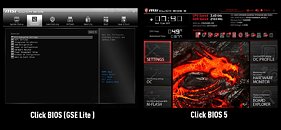- Joined
- Oct 9, 2007
- Messages
- 47,229 (7.55/day)
- Location
- Hyderabad, India
| System Name | RBMK-1000 |
|---|---|
| Processor | AMD Ryzen 7 5700G |
| Motherboard | ASUS ROG Strix B450-E Gaming |
| Cooling | DeepCool Gammax L240 V2 |
| Memory | 2x 8GB G.Skill Sniper X |
| Video Card(s) | Palit GeForce RTX 2080 SUPER GameRock |
| Storage | Western Digital Black NVMe 512GB |
| Display(s) | BenQ 1440p 60 Hz 27-inch |
| Case | Corsair Carbide 100R |
| Audio Device(s) | ASUS SupremeFX S1220A |
| Power Supply | Cooler Master MWE Gold 650W |
| Mouse | ASUS ROG Strix Impact |
| Keyboard | Gamdias Hermes E2 |
| Software | Windows 11 Pro |
AMD succeeded in delivering on its backwards-compatibility promise for the 3rd generation Ryzen processors on motherboards based on AMD 300-series and 400-series chipsets. This promise was very close to being derailed suggests a community thread on MSI forums. According to MSI representatives active on the forum, the capacity of the SPI flash EEPROM chip that stores the motherboard UEFI firmware is woefully limited to cram in the AGESA ComboAM4 1.0.0.3a microcode on many of its motherboards.
The company had to make several changes to its UEFI BIOS package that's currently being circulated as a "beta," to accommodate support for 3rd generation Ryzen processors along with AGESA ComboAM4 1.0.0.3a. First, it had to kick out support for A-series and Athlon processors based on the 28 nm "Bristol Ridge" silicon. Second, it had to [and this is a big one], kick the RAID module, breaking SATA RAID on many of its motherboards. Third, it had to replace its feature-rich Click BIOS 5 setup program with a barebones "GSE Lite" Click BIOS program, which lacks many of the features of the original program, and comes with a dull, low-resolution UI. This program still includes some essential MSI-exclusive features such as A-XMP (which translates Intel XMP profiles to AMD-compatible settings), Smart Fan, and M-Flash.

The scary part? Many other motherboard brands appear to be using 16-megabyte EEPROMs on their older socket AM4 motherboards. These companies are bound to run into similar ROM capacity issues unless they keep their UEFI setup programs lightweight. Motherboards based on the latest X570 chipset feature 32-megabyte EEPROMs. The AMD X570 chipset lacks support for not just "Bristol Ridge," but also first-generation Ryzen "Summit Ridge" and "Raven Ridge" processors.
We recommend that unless you literally possess a 3rd generation Ryzen processor, do not update the BIOS of your older socket AM4 motherboard. You may risk losing features and break your RAID volumes. Find out the latest version of BIOS that has the classic AGESA PinnaclePI 1.0.0.6 microcode, and use that instead.
View at TechPowerUp Main Site
The company had to make several changes to its UEFI BIOS package that's currently being circulated as a "beta," to accommodate support for 3rd generation Ryzen processors along with AGESA ComboAM4 1.0.0.3a. First, it had to kick out support for A-series and Athlon processors based on the 28 nm "Bristol Ridge" silicon. Second, it had to [and this is a big one], kick the RAID module, breaking SATA RAID on many of its motherboards. Third, it had to replace its feature-rich Click BIOS 5 setup program with a barebones "GSE Lite" Click BIOS program, which lacks many of the features of the original program, and comes with a dull, low-resolution UI. This program still includes some essential MSI-exclusive features such as A-XMP (which translates Intel XMP profiles to AMD-compatible settings), Smart Fan, and M-Flash.

The scary part? Many other motherboard brands appear to be using 16-megabyte EEPROMs on their older socket AM4 motherboards. These companies are bound to run into similar ROM capacity issues unless they keep their UEFI setup programs lightweight. Motherboards based on the latest X570 chipset feature 32-megabyte EEPROMs. The AMD X570 chipset lacks support for not just "Bristol Ridge," but also first-generation Ryzen "Summit Ridge" and "Raven Ridge" processors.
We recommend that unless you literally possess a 3rd generation Ryzen processor, do not update the BIOS of your older socket AM4 motherboard. You may risk losing features and break your RAID volumes. Find out the latest version of BIOS that has the classic AGESA PinnaclePI 1.0.0.6 microcode, and use that instead.
View at TechPowerUp Main Site





